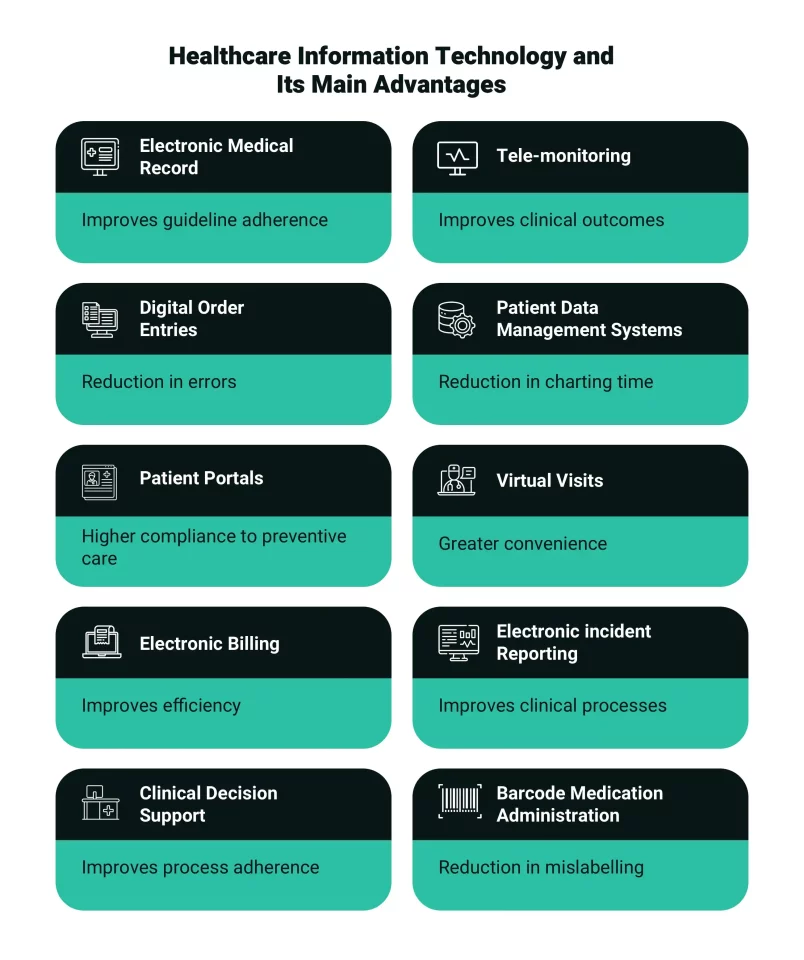INTRODUCTION
The role of IT consulting in digitally transforming the healthcare landscape
Information technology (IT) is revolutionizing every sphere of activity in the world. The importance of IT in healthcare operations, delivery and outcomes is growing after the COVID-19 pandemic. While the impact is quite evident across hospitals, pharmacies, insurance companies, and patients, the journey to digital transformation has just begun.
Evolving consumer behavior and market forces, together with rapid digitization and innovative technologies, have healthcare enterprises scrambling to deploy big-ticket projects.
However, in the absence of technical expertise, a data-driven plan, and a long-term strategy, they fail to leverage the full benefits of hospital information technology.
According to the Deloitte Center for Health Solutions-Scottsdale Institute, many hospitals and health systems have adopted a piecemeal approach to IT in healthcare initiatives. Some build electronic health records, others build mobile health apps for patients, and some embrace disruptive technologies like artificial intelligence, but none tweak existing business and customer models to match technological changes.
It is clear, therefore, that healthcare enterprises are in need of a trusted partner who will help them overcome the following:
- The fear of automation and job loss
- Challenges to integrating new software with complex legacy systems risks
- Threats to sensitive patient privacy and data security
- Resistance to changes in work processes and culture
Such support can only come from someone who knows and understands the benefits of information technology in healthcare.
CONCEPT
What is the meaning of healthcare IT consulting services?
Healthcare IT consulting services refer to expert advisory, implementation, and management services offered by a third-party with immense experience and expertise in the healthcare domain to any healthcare industry player. It may involve hardware, software, and services.
IT in healthcare helps in projects aimed at digital transformation, strategic planning, implementing new technology, improvements to workflow and communication, revamping competitive practices, strengthening HR and people management, and optimizing patient care.
As the demand for healthcare IT (HCIT) consulting is on the rise, the services are becoming more differentiated to include HCIT change management, HCIT business process management, HCIT security set-up, and risk assessment, HCIT enterprise software strategy and data analytics, HCIT integration and migration and so on.
Due to the increasing importance of IT in healthcare, the global healthcare IT consulting market size grew from $45.17 billion in 2022 to $53.31 billion in 2023 at a compound annual growth rate (CAGR) of 18%. Despite the recessionary trends due to the Russia-Ukraine war, it is expected to grow to $102.46 billion in 2027 at a CAGR of 17.7%. The time is ripe for all stakeholders to tap healthcare IT through expert consultancy services.
Want to reap the benefits of rapid digitization in the healthcare industry?
BENEFITS
Why is IT consulting important for healthcare businesses?
IT in healthcare solutions is evolving at breakneck speed. Unless you cash in on technology trends, you will lose the competitive edge over other players in the field. However, you also need to ensure security and privacy with total preparedness for disaster recovery. You cannot compromise on quality of care, but neither can you afford to have your costs sky-rocketing. Without making room for errors, you have to facilitate seamless collaboration.
This is where an expert consultant who knows the importance of IT in healthcare steps in to advise you to:
Choose the right technologies
IT in healthcare software consultancy services will help you choose the right blend of solutions from the ever-increasing options: big data, cloud, artificial intelligence, augmented reality, blockchain in healthcare market, etc.
Remember, a good IT consultancy will always help you identify your digital transformation pathway and then choose the technology software, tools, and apps and not vice versa.
Plan and allocate budget
An IT consultant will also guide you on the correct role of information technology in the healthcare industry. Allocation of budget for digital transformation will hence be based on RoI with measurable KPIs and implementation scalability.
Build talent pool
Healthcare businesses need technical talent who understands what is healthcare IT consulting and can collaborate with domain experts who come in to help. HCIT consultants also help to pick and build teams that can lead and govern digital transformation.
Cut costs not quality
Digital transformation of healthcare enterprises builds efficiency, augments productivity, and builds new cost-effective business models. IT consulting services provide strategic planning that aligns with organizational goals and upholds quality.
Ensure regulatory compliance
Healthcare IT consulting experts will make sure you are on the right side of the law. They advise you on the latest standards, rules, and guidelines. Data interoperability, security and privacy will always be given prime importance in all their advisory services as it is the essence of value-based care.
IMPACT
Digital transformation of healthcare
Healthcare IT consulting addresses the concerns of stakeholders who use various technologies. It aids digital transformation in the following ways:
- Assess existing technology and processes to suggest the latest solutions.
- Devise a digital strategy in line with the business needs and goals.
- Design and implement the digital transformation project with clear KPIs.
- Manage the transition to the digital environment.
- Assess, maintain, and, where needed, refresh the long-term digital objectives.
When a healthcare IT consulting firm guides you through digital transformation, it will empower you to adopt information technology to improve your performance and competitive position.
What this essentially means is that a physician is no longer swamped with error-prone paperwork, can devote more time to patient engagement, increase patient safety, and decrease medical errors; the patient has easy access to electronic health records, can manage chronic diseases, use apps to schedule visits and order medicines; government health officials can plan better public health policies to treat and prevent spread of diseases; healthcare workers can improve their productivity and efficiency; pharmacies and insurance companies speed up order delivery and claims processing; and healthcare enterprises can make their services seamless and cost-effective, embracing latest technologies.
Clearly, digital transformation is not just a transfer from paper to electronic medium. In the healthcare sector, it is the modern method of delivering care through improved processes and efficiency for the well-being of a patient. It is also the use of digital technologies to radically improve the performance, accessibility, and reach of healthcare.
Download our playbook on How To Build a Digital Health Ecosystem here
Want to know how innovative technologies can take you one step closer to achieving digital transformation?
IMPORTANCE
How can healthcare IT help business operations
Healthcare IT can help improve business operations through workflow automation, upgradation of software, integration with apps, migration from legacy systems, configuration of mobile apps in healthcare, and development of new features. Specific telehealth solutions featured in the infographic below and implemented as part of digital transformation can provide measurable outcomes that help improve productivity.
 Impact of HCIT on patient care
Impact of HCIT on patient care
In addition, healthcare IT boosts business efficiency in the following strategic ways:
Optimizing workflows
Business operations can be optimized and workflows improved with the help of healthcare IT solutions and this will ultimately boost patient care. Upskilling staff to handle modern technologies helps to streamline work processes.
Improving communication
Training the team to communicate in a timely and clear manner will impact business operations positively. Collaboration to assess existing policies, find solutions to problems, and make technical improvements is a natural corollary.
Focusing on patient care
Healthcare IT solutions augment patient care pathways. There is clarity and accountability on what everyone is working on. It should, however help to free up the doctor to engage with the patients, not software!
Rewarding performance
It is not enough for healthcare IT services to address only the tools and technologies that need a redesign for digital transformation. The people roles and reward systems also need to be continuously upgraded to encourage stellar performance.
Managed IT services
Check if your IT in healthcare partner offers managed IT services such as remote support maintenance and outsourcing. Avail it to save precious time that you can devote to your business.






